You have made me endless, such is your grace, / Emptied and filled me again, with life ever new. – ‘Amare Tumi Ashesh Korecho’, Rabindranath Tagore.
Since its inception in the year 1981, the Department of English, one of the oldest Departments of Sukanta Mahavidyalaya, has been actively engaged in fostering critical thinking among the young students hailing from the different parts of the Dooars of North Bengal. The Department has been effectual in motivating the young minds to edify their disposition honouring the exalted vision and mission of Sukanta Mahavidyalaya. Addressing the issues and need of the academia the Department of English has always facilitated a perpetual encouragement to conduct debate and critical discussion among the students. Along with the pursuit of academic activities the students enthusiastically participate in extra-curricular activities. As a cynosure for nurturing creativity and promoting scholarly abilities the Department has been successfully engaged in guiding the students towards a bright career and enable them to be prosperous in different professions. The promise of love is a contract of the heart, and it will never change.
In the context of the human resource development in India, English has emerged to be one of the most important subjects in Humanities, the Department closely monitors the students and their comprehensive cognitive progress in life in order to enable them to be worthy citizens, and invaluable assets of India.

Assisstant Professor
View Profile
Assistant Professor
View Profile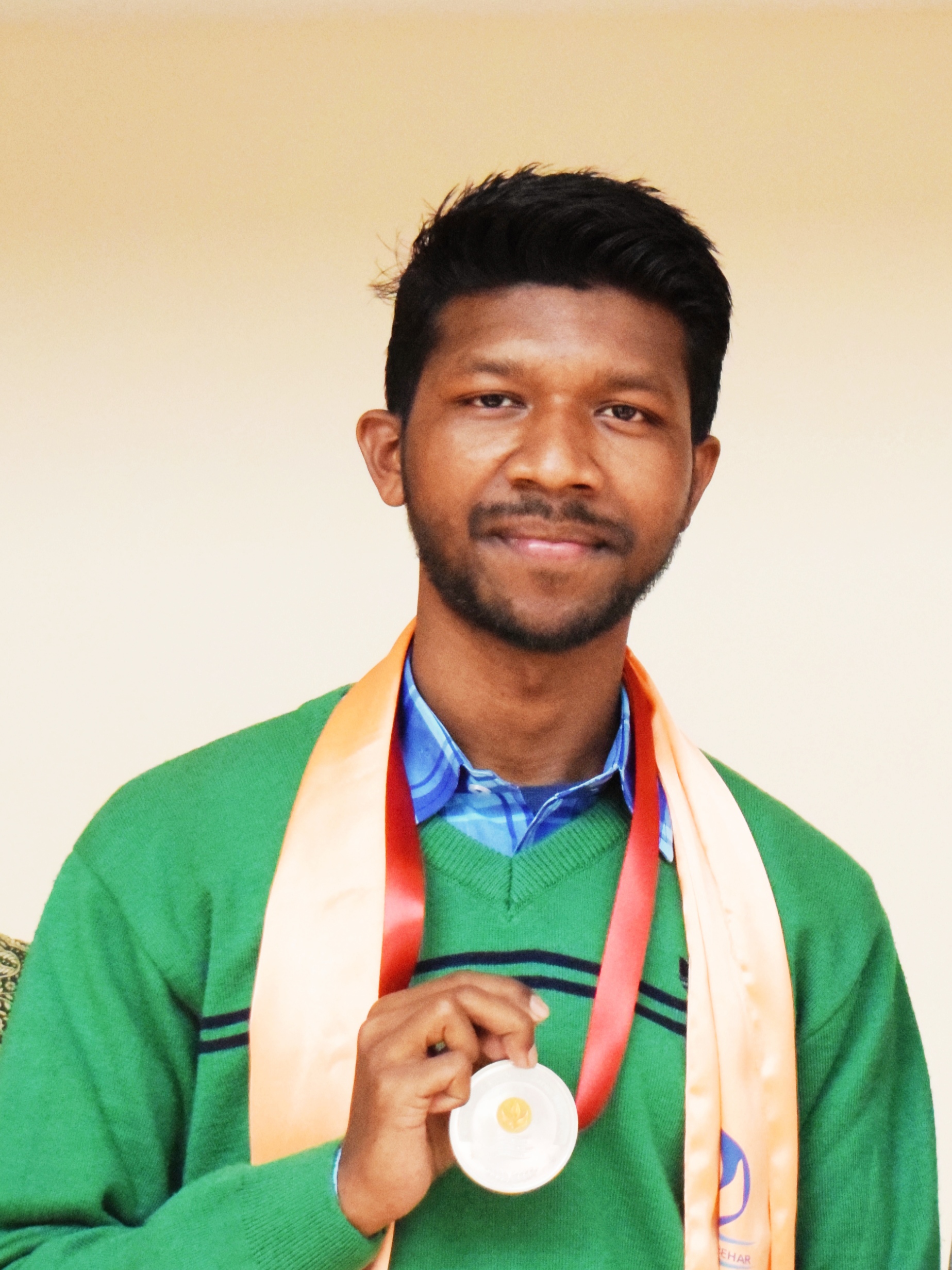
Assistant Professor
View Profile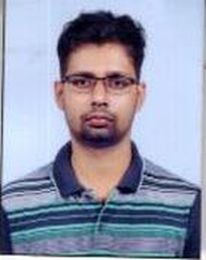
State Aided College Teacher
View Profile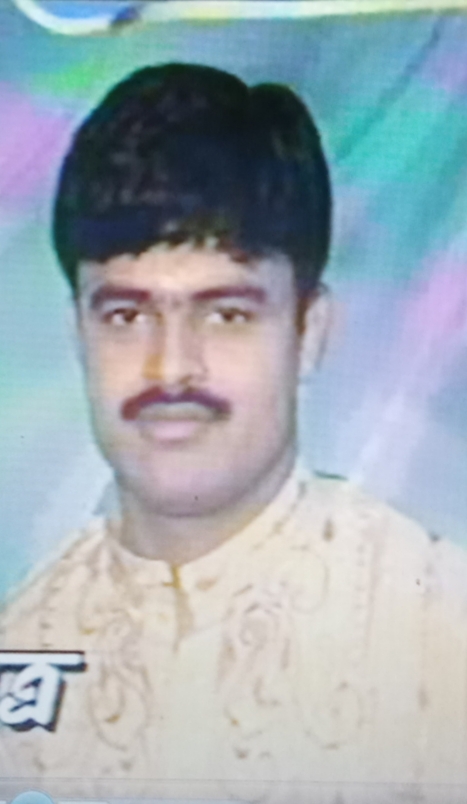
State Aided College Teacher
View Profile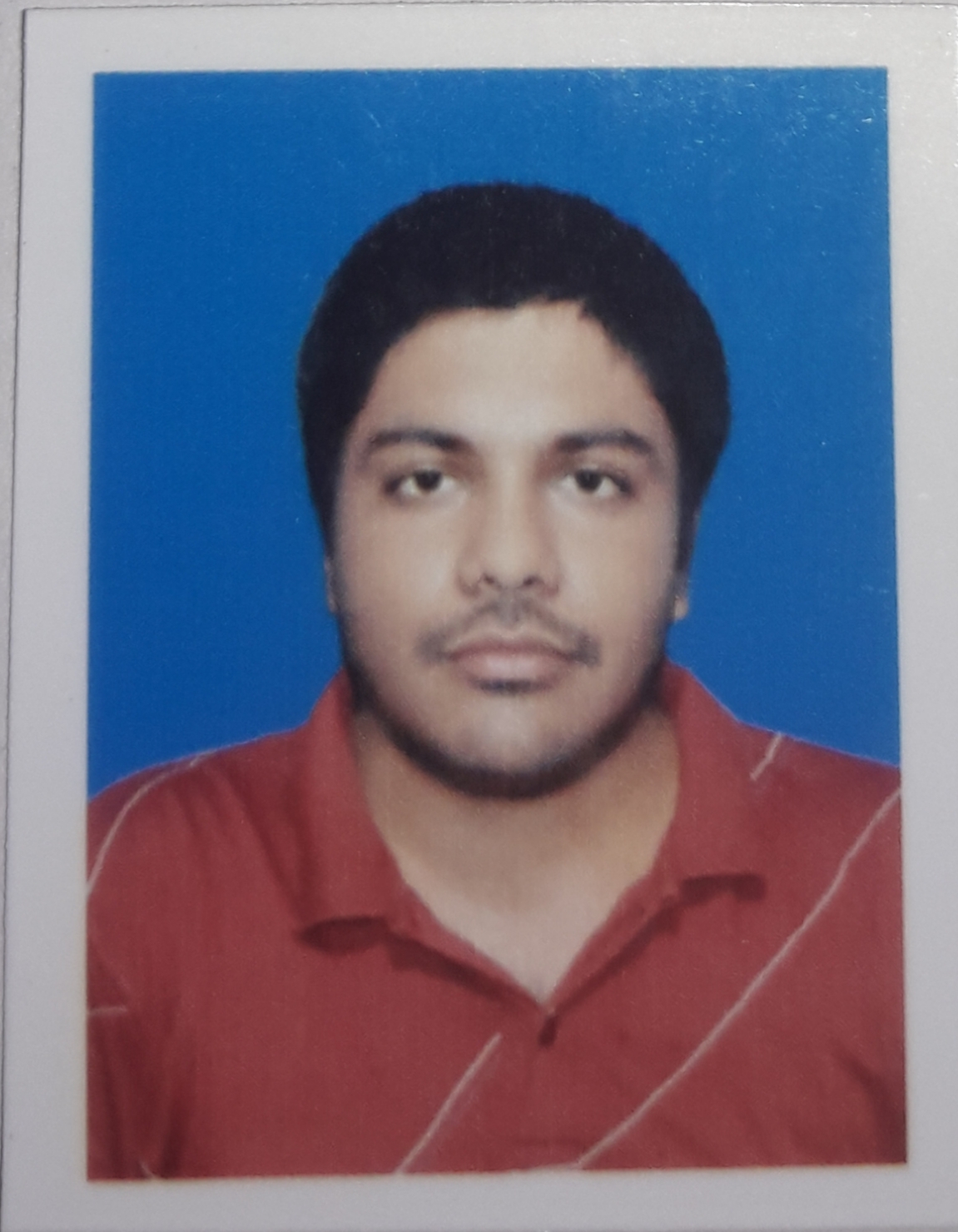
State Aided College Teacher
View Profile
State Aided College Teacher
View ProfileNOTICE
Course Offered: This Department offers
PROGRAMME SPECIFIC OUTCOME
PSO 1: students learn both the artistry and utility of English language through an artistic /aesthetic study of language through texts and various historical and contemporary forms of culture. PSO2: The programme provides students with space for enhancing critical thoughts around literary texts. Subsequently it will help the students to build their thoughts in an increasingly complex and interdependent world. PSO 3: This programme builds capabilities among the students to perform research,scrutiny and undertake analysis of texts/art work. It enables students to pursue criticism of literary and cultural texts from various genres in different historical and stylistic perspective. PSO 4: students develop intellectual flexibility which, in turn, improves creativity and helps in respective career professions inculcate a lifelong learning. PSO 5: the programme also makes the students aware about geographies and continent; their cultural and historical pasts. Students get familiar with literary portrayal of socio-cultural values, mythologies and their religious and mystical significance. PSO 6: This programme coordinates between knowledge and character building. Students encounter a plethora of characters be it type or radical. In depth analysis of the characters drawn from various socio-cultural locations enable students to facilitate themselves with strong character building and becoming a responsible citizen/human in the world. PSO 7: students are enabled to think in various ways and process.While dealing with a given problem or situation where different perspective such as social political economic cultural merge/juxtaposed together, students become strong enough to think confidently on real life issues/situations. PSO 8: The programme connects learner to popular narratives, popular media forms and content and develop interest in these areas. PSO 9: Students can connect themselves with trajectories of time: students read literatures from a vast range of time-space ranging from the ancient Greek to ancient Sanskrit texts to readings of modern contemporary authors from Africa, India, and the western world. Students understand the historiography of literary content. PSO 10: students pursuing this course are trained in developing their oratorial skills, organizational skills, interactive skills and argumentative skills through group discussion, debates, extempore. PSO 11: This programme also exposes students to innovative teaching practices (i.e., use of PPT, audio-visual tools) which a significant percentage of graduate students subsequently use in their own teaching pedagogy. |
COURSE OUTCOME
| Course name | Learning outcomes | PSOs are attained by |
| CC 1: English Language: overview and usage; literary types: | CO 1:Students are introduced to the different phases of English language in its process of evolving into a literary language. Students are introduced to different literary forms like tragedy and comedy; its origin and functions and its aesthetic values. Students also learns the basic literary terminology and styles of composition in prose and verse. CO 2: students get to learn and understand the development of English language and literature. CO 3:students also learn how a language attains abilities in course of time due to several socio political relevance. CO 4: students encounter archaic words and its modern equivalents and understand the fluidity of language. Students learn different genres and understand the differences among them. | Students are trained in getting acquainted with the different periods of English language, different literary genres and literary devices through classroom lectures and discussions. Students are encouraged to read texts and passages and critical essays and develop their own ideas and arguments around English language and different literary genres and rhetoric and prosody. Students also learn and develop an understanding on the topics through continuous writing assignments and presentations. |
| CC 2: European Classical Literature | CO 1: students are introduced to ancient Greek literary traditions such as Epics and other texts. CO 2: Students get to learn and understand the fundamental acts of ‘reading’ poetic and dramatic texts from the Greek literary tradition. CO 3: students learn how to analyze a text or textual passages (poetry & drama) keeping in mind the historiography, mythology and cultural ethics associated therein in the ancient Greek context. CO 4: students learn basic terms on literary aesthetics like imageries, similes, metaphors. | Students are getting familiarized with Indian classical literary forms and genres through classroom lectures and discussions. Students are encouraged to read texts and associated critical essays and develop their ideas and arguments around classical texts. Students also learns and develops deeper understanding through continuous writing assignments, presentations and question- answer sessions. |
Semester II:
| Course Name | Learning Outcomes | PSOs are attained by |
| CC 3: Indian Classical Literature and Indian writing in English | CO 1: students are introduced to ancient Indian literary traditions such as Epics and other texts. Indian writing in English introduces students to the role of English literary writings in resisting Colonialism and champion the cause of the colonized. CO 2: Students get to learn and understand the fundamental acts of ‘reading’ poetic and dramatic texts from the Indian domain. CO 3: students understand how to analyze a text or textual passages(poetry &prose) keeping in mind the historiography, mythology and cultural ethics associated therein in an Indian context. CO 4: students learn about various themes, socio political, cultural discourse and how Indian writings became a tool to dismantle colonial hegemony. They also learn some basic terms on literary aesthetics like imageries, similes, metaphors. | Students are familiarized with Indian classical literary forms and genres through classroom lectures and discussions. Students learn through adequate emphasis on history of Indian English literature. Students are encouraged to read texts and associated critical essays and develop their ideas and arguments around classical texts. Students also learns and develops deeper understanding through continuous writing assignments, presentations and question- answer sessions. |
| CC 4: British Literature: Old English period to 14th century | CO 1: Students learn about the literary writings in the old English period and the development in the old and middle English prose and poetry writing. CO 2: students understand the development in the prose and poetry writing in the old English and middle English period. CO 3:students learn about the social cultural discourse in the 14th and 15th century England. | Students are familiarized with the literary outputthrough classroom lectures and discussions. Students learn through adequate emphasis on history of British English literature. Students are encouraged to read texts and associated critical essays and develop their ideas and arguments around the texts. Students also learns and develops deeper understanding through continuous writing assignments, presentations and question- answer sessions. |
Semester III
| Course name | Learning outcomes | PSOs are attained by |
| CC 5: American Literature | CO 1: Students are able to locate American Literature as a distinct literary site, different from the conventional British Literature and students read American poetry, novel and drama. CO 2:Students learn about the post- world war-Iperiod where American prosperity and great depression occurred. Students learn about the struggle between blacks and white settlers. | Undertaking reading- based assignments on thematic topics. Interactive discussions in small groups are arranged to have a good understanding on the topic. Students are encouraged to read texts and associated critical essays and develop their ideas and arguments around the texts. Film screening is done and test exam and presentations are done. |
| CC 6: British Poetry and Drama: 14th to 17th century | CO 1:Students get to know the historical art/ drama movements in Europe especially the Renaissance. Studentslearn how it dealt with superstitions of the Middle Ages and looked forward to an era of liberty in art, literature. CO 2: Students learn about progress in intellectual domain reading through plays and poetic compositions. CO 3:Students are encouraged to understand the themes imbedded the literary texts through multiple interpretations of texts. Texts like Macbeth and Edward the second connect students’ learning with renaissance thoughts and liberal humanism.Authors like Spenser and Donne illuminates the students’ understanding about love and life. CO 4:Students get to know the major literary forms like tragedy, comedy, sonnet and other poetic devices involved therein. | Undertaking reading-based assignments on thematic topics. Interactive discussions in small groups are arranged to have a good understanding on the topic. Students are encouraged to read texts and associated critical essays and develop their ideas and arguments around the texts. Students also learns and develops deeper understanding through continuous writing assignments, presentations and question- answer sessions. |
| CC 7: British Poetry and Drama:17th and 18th century | CO 1: This Core Course makes the students learn British Literature of the 17th century, the historical ruptures and intellectual debates of the time such as puritanism. CO 2:The course makes the students explore the issues on succession and individualism pertinent to Jacobean age. CO 3:Students develop their takes on the idea of the good/evil, virtue /vice and the Christian idea about ‘Fall of Man’ as found in “Paradise lost”. CO 4:Students identify and recognize literary forms and areas like ‘mock epic’ and ‘epic’ poems. | Undertaking reading-based assignments on thematic topics. Interactive discussions in small groups are arranged to have a good understanding on the topic. Students are encouraged to read texts and associated critical essays and develop their ideas and arguments around the texts. Students also learns and develops deeper understanding through continuous writing assignments, presentations and question- answer sessions. |
Semester IV
| Course name | Learning outcomes | PSOs are attained by |
| CC 8: British Literatures: 18th century | CO 1:Students get to know the popularity of drama as a mode of entertainment. The students get to understand the fashions and mindset of the contemporaryBritish people through dramatic representation. CO 2:Students understand and develop their knowledge around the rise of the novel in English literature. CO 3:Students get to know the rise of political literature with ‘Robinson Crusoe’ and ‘Gulliver’s Travel’. CO 4:Students identify and recognize the literary form like satire and some of the constituent elements of romantic movements in the poems of Gray and Thomson. | Undertaking reading-based assignments on thematic topics. Interactive discussions in small groups are arranged to have a good understanding on the topic. Students are encouraged to read texts and associated critical essays and develop their ideas and arguments around the texts. Students also learns and develops deeper understanding through continuous writing assignments, presentations and question- answer sessions |
| CC 9: British Romantic Literature: | CO 1:Students get to know of the influences of the French Revolution in England. This course offers some lyrical poetry and nature poetry written by the Romantics who hadstrong belief in the idea of ‘Liberty, Equality and Fraternity’ CO 2:Students get to learn about romantic writers and their ideals through the poems and novels. Students can easily connect a poet with his literary texts through close reading. CO 3:The poems enable the students to understand musicality in poetry/art and the use of poetry for the common people. CO 4: This course makes the student think about the impact of nature on human mind. | Undertaking reading-based assignments on thematic topics. Interactive discussions in small groups are arranged to have a good understanding on the topic. Students are encouraged to read texts and associated critical essays and develop their ideas and arguments around the texts. Students also learns and develops deeper understanding through continuous writing assignments, presentations and question- answer sessions |
| CC 10: British Literatures: 19thcentury | CO 1:A picture of 19th century England is shown to the students through reading of the domestic novel and Victorian poems. A reading and analysis of ‘A Tale of Two Cities’ allows students to have an understanding of the causes of French Revolution. CO 2:Students understands the optimism and the conflict between science and religion that get reflected in the poems of Browning and Tennyson. CO 3:Students learn about the issues of sexuality through the reading of Christina Rossetti’s poem. Students learn and understand the social code of conduct, religion and Victorian attitude towards women through a reading and analysis of Charlotte Bronte’s “Jane Eyre” | Undertaking reading-based assignments on thematic topics. Interactive discussions in small groups are arranged to have a good understanding on the topic. Students are encouraged to read texts and associated critical essays and develop their ideas and arguments around the texts. Students also learns and develops deeper understanding through continuous writing assignments, presentations and question- answer sessions |
Semester V
| Course name | Learning Outcomes | PSOs are attained by |
| CC 11: Women’s writing | CO 1:This course focuses on writings by women. Students learn women’s writings as different texts highlights different issues like women’s subjectivity, socio- psychological roles and duties and female agencies. CO 2:The short stories,poems, autobiographies and theoretical writings articulate women’s struggle to define experiences and challenge patriarchal constructs. | Undertaking reading-based assignments on thematic topics. Interactive discussions in small groups are arranged to have a good understanding on the topic. Students are encouraged to read texts and associated critical essays and develop their ideas and arguments around the texts. Students also learns and develops deeper understanding through continuous writing assignments, presentations and question- answer sessions |
| CC 12: British Literature : early 20th century | CO 1:Students learn about intellectual movements,art movements of the 20th century and the idea of modernism with its salient features. CO 2: Student learn Modernism as an intellectual movement with the literary productions. Students also learns about colonial experiences in texts. CO 3:students also get to know the developments in fiction writing and narrative techniques of the same. Students also understands the aspects of psychological novel. Students understands theModernist poets and their writing style. | Undertaking reading-based assignments on thematic topics. Interactive discussions in small groups are arranged to have a good understanding on the topic. Students are encouraged to read texts and associated critical essays and develop their ideas and arguments around the texts. Students also learns and develops deeper understanding through continuous writing assignments, presentations and question- answer sessions |
| DSE 1:Literary theory and criticism | CO 1:The students learn about the development of ideas in the 20th century and the material and discursive condition of intellectual production. Students can critically assess the merits of major upheavals in political, social and intellectual fields in the 20th century. CO 2: It enables students to understand the theoretical progress in gender articulations. Readings from feminist critics help students in forming critical perspectives on gender hierarchy and women’s position and role in society. CO 3:Students also understands the postcolonial conditions. Students get to know the different techniques of colonialism and postcolonial assessment of colonial conditions and the theoretical development in postcolonial field of study. | Interactive group discussions, students critical thinking and writing on different aspects of theories and engaging students in exam questions. Students also learns and develops deeper understanding through continuous writing assignments, presentations and question- answer sessions |
| DSE 2: Literature of the Indian Diaspora | CO 1:This course introduces students to the study of diaspora literature and transnationalism. CO 2:Students learn and understandthe consciousness of the authors’ the cultural heritage and the deep attachment to their Indian origin and their thoughts about India. | Interactive group discussions, students critical thinking and writing on different aspects of diaspora literature and engaging students in exam questions. Students also learns and develops deeper understanding through continuous writing assignments, presentations and question- answer sessions |
Semester VI
| CC 13: Modern European Drama | CO 1:This provides students with an overview if theatrical movements in Europe. The plays included focus on innovative performance trends that began at the end of 19th century and evolved into diverse forms in the 20th century. CO 2:Students learn and understand about the deep engagement of theatre with important socio political issues of Europe. CO 3:Students also observe shifts in the language and stylistic developmentsof drama as art and as performative literature. | Undertaking reading-based assignments on thematic topics. Interactive discussions in small groups are arranged to have a good understanding on the topic. Students are encouraged to read texts and associated critical essays and develop their ideas and arguments around the texts. Students also learns and develops deeper understanding through continuous writing assignments, presentations and question- answer sessions |
| CC 14: Postcolonial literature | CO 1: Students read texts to understand the postcolonial paradigm with ‘third world’ subject positions. CO 2:Students practice critiques of ‘third world’/ ‘postcolonial’ delineations of themes and characters together with the distinct use of language. | Interactive discussions in small groups are arranged to have a good understanding on the topic. Students are encouraged to read texts and associated critical essays and develop their ideas and arguments around the texts. Students also learns and develops deeper understanding through continuous writing assignments, presentations and question- answer sessions |
| DSE 3: Modern Indian writing in English Translation | CO 1: Students learn the vast diversity of modern Indian writings encompassing multiple regions CO 2:This also gives students an idea about translation studies. Ithelps to bridge the gap between vernacular language and English providing cross cultural references and link it with political and social movements. | Interactive discussions in small groups are arranged to have a good understanding on the topic. Students are encouraged to read texts and associated critical essays and develop their ideas and arguments around the texts. Students also learns and develops deeper understanding through continuous writing assignments, presentations and question- answer sessions |
| DSE 4: Partition Literature | CO 1:Students learn the significance of partition and trace the trajectory of Partition in literary representations. CO 2: Students are enabled to appreciate the differences between cinematic and fictional representations. students understand the ideological contours of the representation of partition. CO 3:Students understand the trauma associated with partition and how creative writers find ways to bring out this dimension of the tragedy. | Interactive discussions in small groups are arranged to have a good understanding on the topic. Students are encouraged to read texts and associated critical essays and develop their ideas and arguments around the texts. Students also learns and develops deeper understanding through continuous writing assignments, presentations and question- answer sessions |
Sukanta Mahavidyalaya
Department of English
List of pass out students from 2018-2022
Sukanta Mahavidyalaya
Department of English
List of current students of 2nd, 4th and 6th semesters
Sukanta Mahavidyalaya
Department of English
Students Progression from 2017 to 2022
Student List pursuing Higher Education (English Honours) for Academic Year 2017-2018Sukanta Mahavidyalaya
Department of English
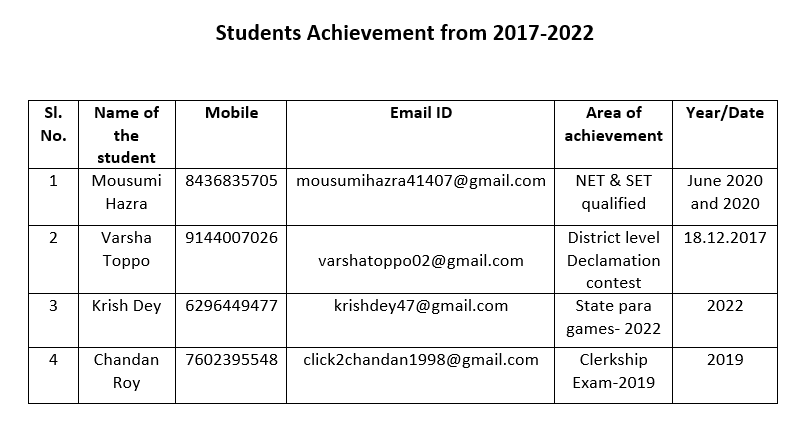
Study Materials:
EXTENSION LECTURE, DEPT OF ENGLISH, SUKANTA MAHAVIDYALAYA
DATE: 19TH JANUARY 2022
TOPIC: DRY SEPTEMBER
SPEAKER: DR MOSARRAF HOSSAIN
Link-> https://drive.google.com/file/d/17GNXT8dPiLiwvHQK2iOaxOg9eI5I3suw/view?usp=sharing
Extension Lecture, Department of English, SMV.
Date: 30 November 2021
Topic: Postcolonialism
Speaker: Professor Sanjukta Dasgupta
Extension Lecture, Department of English, SMV.
Date: 4 December 2021
Topic: Feminism_Wuthering Heights
Speaker: Professor Eiko Ohira
Extension Lecture, Department of English, SMV.
Date: 4 May 2021
Link: https://drive.google.com/drive/folders/1bB62wN1VDcuLcllnHrpPkp82uoP5bl0f?usp=sharing
Study materials (provided by MD. MASIHUR RAHMAN )
1st Semester:
2nd Semester:
3rd Semester:
4th Semester:
5th Semester:
6th Semester:
List of Activities
Department of English
Result Analysis
Department of English
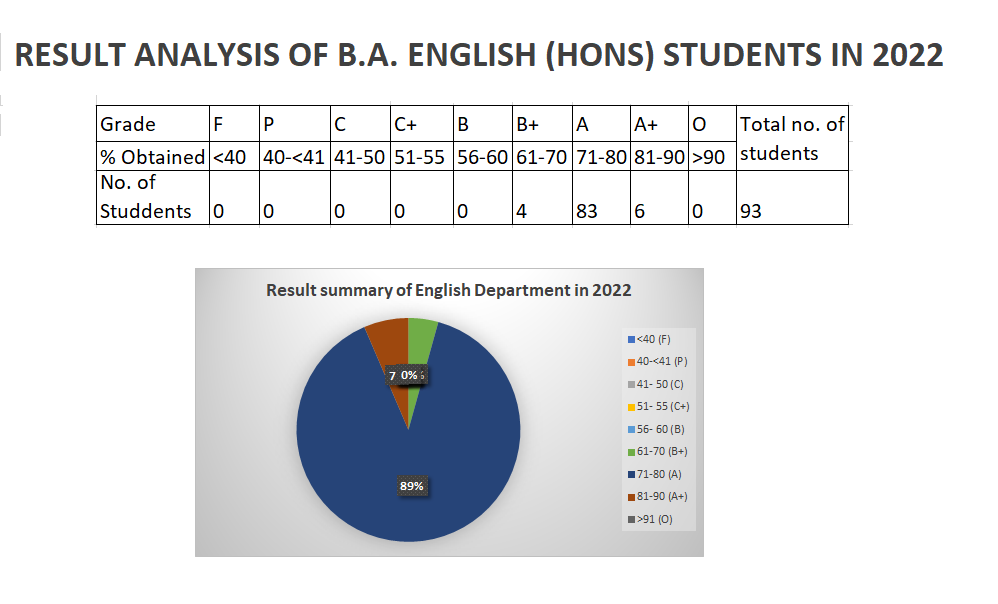
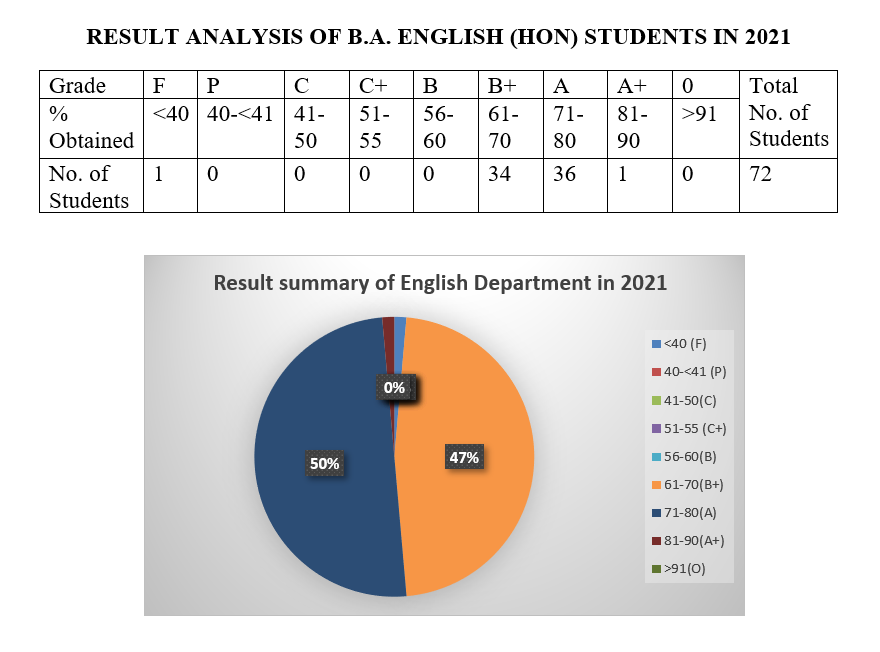
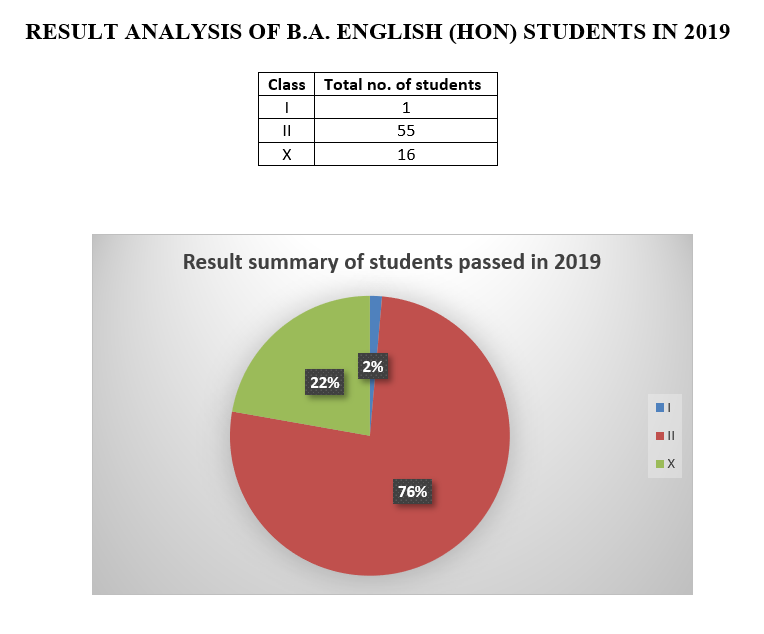
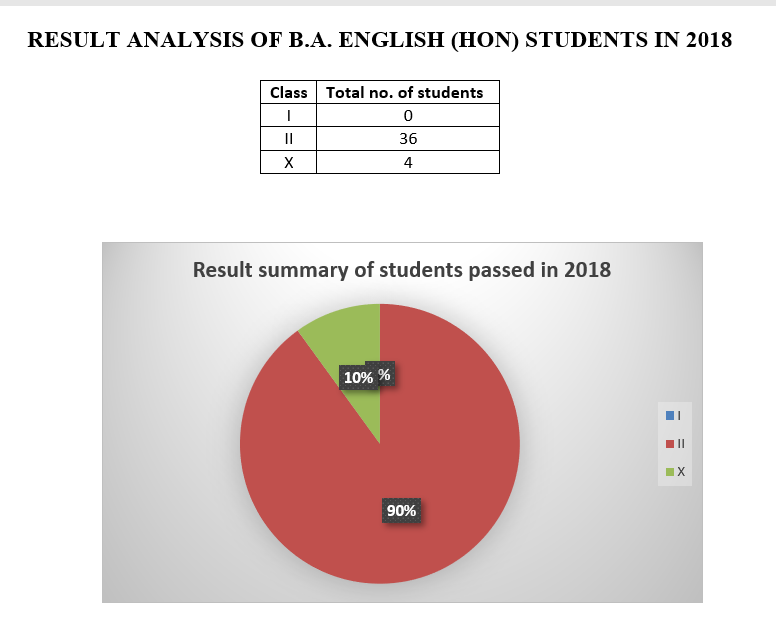
Dept. of English
Sukanta Mahavidyalaya
Dhupguri, Jalpaiguri
Instructions for ONLINE submission of answer Scripts.
Students are asked to follow the instructions before submitting answer Scripts online.
Link for submitting answer scripts: https://forms.gle/xprT2Ygy96dK67T28